
Colorado Senate floor.
It’s a good thing Colorado legislators wear little black plastic nametags—those will come in handy when lawmakers try to identify their colleagues this year.

The legislators who represent constituents in the Front Porch distribution area gathered in the House Gallery at the end of the 2018 session. Back row, Reps. James Coleman and Leslie Herod. Front row, from left, Sens. Lois Court and Angela Williams. Not pictured is Rep. Chris Hansen.
Last November’s elections brought 28 brand-new people to the 100-member Colorado General Assembly. By the time the dust settles in January there could be as many as 32 newbies because four senatorial resignations may be filled by current House members, whose seats in turn will be filled by newcomers.
In addition to the freshmen, five House members were elected to the Senate.
The two chambers’ top leaders are new in their jobs, although not brand-new to leadership. Democratic Senate President Leroy Garcia was minority leader last year, and Democratic House Speaker was majority leader.
The wave of new members brings more women and more Hispanics to the statehouse, plus a cadre of self-described Democratic “progressives.”
Legislature turnover is nothing new; the bigger news out of the November election was the Democratic takeover of the Senate. Combined with the election of Jared Polis as governor, Democrats now control both houses of the legislature and the executive branch.
That sets up a new dynamic, given that control of the legislature has been split since the 2015 legislative session. That meant major bills needed bipartisan support to pass. And more ideological bills on both sides tended to fare poorly.
So, in theory, Democrats now can do whatever they want. In practice that won’t happen in all cases because:
There will be occasional splits in the Democratic caucuses, and between lawmakers and Polis.
Bipartisan relationships forged over the last four years won’t disappear, and veteran Republicans will still have a voice with veteran Democrats.
Some Democratic policy dreams are expensive and may run up against Colorado’s unique constitutional provisions, which require voter approval of new taxes and set limits on how much state spending can grow every year.
While a lot of faces at the Capitol are new, most of 2019’s issues are all too familiar. Here’s a quick overview of what lawmakers will be wrestling with:
Finance and Budget
Legislators are expected to once again take up the issue of the Gallagher Amendment, the constitutional provisions that governs how much owners and businesses each pay in local property taxes. Interaction between Gallagher and the Taxpayer’s Bill of Rights means property tax revenues are falling for many local governments and special districts, especially fire districts. Lawmakers may have to craft a proposal that ultimately requires voter approval. One less complicated option would be to reimburse local governments for lost revenues, but that might squeeze funding for other programs.
Speaking of TABOR, Democrats are talking about ways to increase that amendment’s limit on how much additional revenue can be spent each year. Some think that can be done with a popular vote; others aren’t so sure.
Lawmakers also need to sort out how to impose sales taxes on e-commerce, something recently allowed by the U.S. Supreme Court. Trying to implement that ruling has exposed the flaws in Colorado’s complicated and fragmented sales tax system.
Strong state revenues make it look like clear sailing for existing programs in the state budget.
Transportation
Voters in November rejected two plans for financing bonds to pay for highway and transportation improvements. Lawmakers have taken some modest steps in recent sessions, including a 2019 ballot measure that would raise funding. That plan may get cancelled, and lawmakers face tough decisions on this issue. The question ultimately may have to go to the voters again.
Energy Development and the Environment
Voters also rejected a 2018 ballot measure to regulate energy development. Legislative Democrats have pushed in the past for tighter controls, including greater setbacks between wells and homes, and they no longer have to worry about a Republican Senate. But the energy industry remains a strong lobbying force.
Health care and Insurance
Gov. Polis has repeatedly expressed his support for universal health coverage, and legislature Democrats have pushed for various ideas in past sessions. Cost may be the biggest barrier to Democratic plans. Also look for bills on opioid addiction treatment and prevention, transparency of hospital and drug costs and regulation of free-standing emergency rooms.
Housing and Economic Security
Democrats also have been interested in “economic security” bills such as mandatory paid family leave and ideas to make housing more affordable. Again, cost will be a barrier.
Education
Polis has expressed strong interest in state funding for full-day kindergarten. But some lawmakers wonder if additional money would be better spent on expanding preschool access. In either case, the trick will be finding the money.
Hot-button issues
Lawmakers will see a “red flag” bill allowing authorities to confiscate guns from people with mental health issues. Bills banning gay conversion therapy and addressing gender identification issues on birth certificates and driving licenses also are expected.
Northeast Denver in the Legislature
Northeast Denver is an island of stability amidst all the statehouse turnover. All five of the area’s Democratic lawmakers are back at the Capitol.
Sens. Lois Court (District 31) and Angela Williams (33) are in the middle of their terms so weren’t on the ballot last November. Reps. Chris Hansen (District 6), James Coleman (7) and Leslie Herod (8) all were re-elected, Hansen and Herod without opposition.
All five hold leadership positions in the new legislature. Court has been elected president pro-tempore (the chamber’s second-highest but largely ceremonial position, in the opinion of some) and is chair of the Senate Finance Committee while Williams leads the Business, Labor and Technology Committee.
Hansen has joined the Joint Budget Committee and chairs the House Appropriations Committee. Coleman is co-whip (a party floor manager) and vice chair of the Business Affairs and Labor Committee. Herod chairs the Finance Committee and is vice chair of the Judiciary Committee.
Todd Engdahl’s company, Capitol Editorial Services, is a research firm that provides services to lobbying firms and advocacy groups at the Colorado legislature. He’s a former executive city editor of The Denver Post, launched DenverPost.com and was a co-founder of the website Education News Colorado.



0 Comments